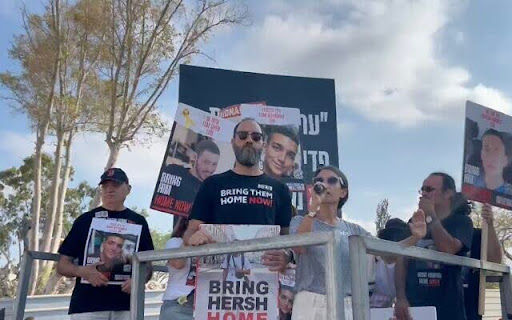Many of us have probably already seen footage of the fences designed to protect the Israeli communities on the Gaza border being breached by the terrorists. Some of the openings they made on October 7th were just large enough for people to walk through. Others were wide enough for cars and even those white Toyota pickup trucks to navigate. The images of the dozens, then hundreds, of terrorists crossing over are haunting.
Yesterday I came across a very different video of the Gaza border being breached; this time by family members of those held hostage trying desperately, albeit symbolically, to rescue their loved ones. It’s absolutely heart wrenching. Of course, the families did not actually breach the Gaza border. They broke through the perimeter fence of Kibbutz Nirim and ran toward the internationally recognized border with the Gaza Strip–but did not actually cross over. They remained separated from their loved ones by meters, just as they have been for over 325 days.
 What a painful and powerful image nonetheless. What a poignant split screen. On one side, bloodthirsty terrorists breaking a cease-fire and violating an internationally recognized border in order to pilage, rape, terrorize, and murder. On the other screen, desperate family members, filled with compassion and hope, attempting to breach the border in order to save their loved ones.
What a painful and powerful image nonetheless. What a poignant split screen. On one side, bloodthirsty terrorists breaking a cease-fire and violating an internationally recognized border in order to pilage, rape, terrorize, and murder. On the other screen, desperate family members, filled with compassion and hope, attempting to breach the border in order to save their loved ones.
As they ran toward the fence, the families chanted: “Et kulam – ACHSHAV! (Bring all of them home, NOW!).” A member of the Albag family yells out, “Liri, ani ba’ah! (Liri, I’m coming to save you!”).
Yehudah Cohen, whom I had the honor to speak with a few weeks ago, is the father of Nimrod, a soldier who was taken hostage on October 7 from the Nahal Oz army base. He spoke to his son through large speakers set up to project his voice into Gaza itself: “Nimrod, Abba is speaking, we’re here at the border, I will not give up until you come home. I will run everywhere in the world until we have a deal that will free you and the other hostages.”
Varda Ben Baruch, the grandmother of Edan Alexander, a 20-year-old lone soldier from Tenafly, New Jersey, shared these words to her grandson: “It’s Grandma and Grandpa, you are our soul, do you hear us? Idanaleh! Mom and Dad are waiting for you, we’re worried about you and waiting for your return home. Be strong, you’re strong, survive, we’re doing everything we can for you and for all the other hostages.”
Rachel Goldberg-Polin recited a prayer for her son:
“It’s Mama, Hersh. It’s day 328. We are all here. All the families of the remaining 107 hostages. Hersh we are working day and night and we will never stop. I need you to know that I am giving you the blessing I give you every single morning when I pray for you and every Friday night I go out on the porch and I put my hands up toward Gaza and I give you the [Priestly] Blessing: May God bless you and keep you. May God shine His face upon you and be gracious to you. May God lift up God’s face toward you. May God give you peace and may God bring you home! ”
Clearly, this week’s action, sponsored by the Hostage Families Forum, was designed to put pressure on the powers that be–in Israel, the United States, and throughout the world–to get to a deal that will bring the remaining hostages home before it’s too late.
But beyond the politics, the symbolic act of attempting to breach the border was itself a prayer. A prayer of longing. A prayer of love. A prayer of hope.
To their prayers, I add two more of my own: one, a prayer of gratitude for the rescue of Farhan al-Qadi this past week. May he and his family be well and may the brave soldiers of the IDF bring home dozens more in the days to come.
The other is a prayer for fences:
Dear God, may our fences never be breached by those who wish us harm. May they stand strong, protecting us always so that we might live our lives in safety and peace. And should they ever need to be breached, may it only be for the sake of rescue, for the sake of holiness, for the sake of life.
Shabbat shalom,
Rabbi Yoshi
